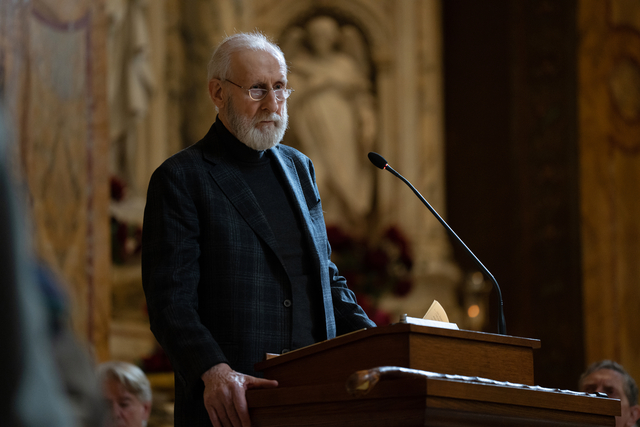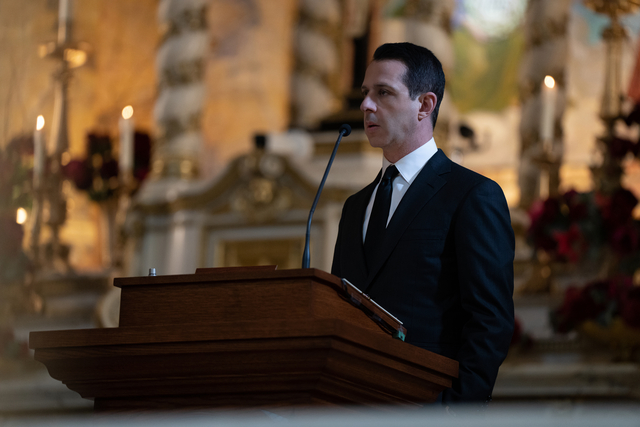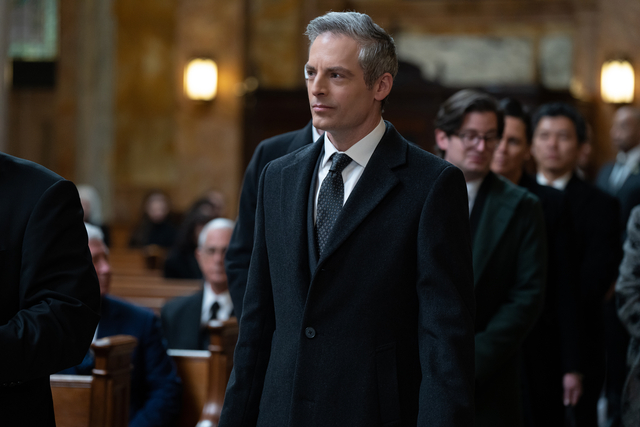Gotta hear both sides! So goes the journalistic maxim turned sarcastic slogan that once championed objectivity in reporting but is now more often invoked to mock news outlets that platform Nazis, conspiracy theorists, and other individuals spewing dangerous disinformation. You can imagine cynics and true believers alike in the bullpen of Succession’s Fox News analog ATN using precisely these words to justify some of that network’s most irresponsible choices.
So it was pretty delightful to see bothsidesism come back to haunt the funeral of Logan Roy, a man who profited more than perhaps anyone in history from the peddling of false balance. If last week’s nerve-fraying Election Day roller coaster faced the global-scale consequences of the Roys’ narcissistic actions, then this week’s penultimate episode of the series was about legacy. Was Logan the “great man” Roman keeps babbling about? Or was he a cancer on his family, business, and adoptive homeland? Thanks to Ewan’s impromptu speech and an abortive eulogy from Roman, who proved to be not at all ready for primetime—which created an opening for Kendall to deliver an eloquent, if also terrifying, rebuttal—we really do get to hear both sides.
What’s exciting about this, aside from the opportunity to see James Cromwell flex in a role where he’s been great but somewhat underutilized, is that, as usual, Succession has more in mind than just Logan. Titled “Church and State”—a triple entendre that refers simultaneously to the separation of institutions that form the foundation of secular society, the media convention of isolating journalists from business decisions to ensure editorial independence, and the fact that literal matters of state are being negotiated in the church where the funeral happens—the episode is really about two polar-opposite visions of what it means to live a good life.

Ewan’s eulogy
It’s hard to imagine security being lax enough at the funeral of a Rupert Murdoch type to allow a renegade brother to take the mic. (Maybe we can blame Connor, who planned the whole shindig but is nonetheless prevented from delivering his own “formally inventive” speech, which in Shiv’s estimation “leaves us open to legal action.”) Well, sometimes narrative and dramatic considerations outweigh the need for verisimilitude. It was important to hear from someone who understood and even loved Logan but was not in thrall to his cutthroat worldview.
“What sort of people would stop a brother from speaking for the sake of a share price?” Ewan demands, after rebuffing Greg and Shiv’s feeble pleas for him to sit down. Only history can judge Logan, he says. “I can just give you a couple of instances about him.” First, we hear a harrowing anecdote about the family’s voyage across the Atlantic during World War II; at four and five-and-a-half years old, the boys were forced to keep quiet and still for three nights and two days to avoid attracting German U-boats. No wonder Logan grew up to be a fortress of self-possession and mental toughness.
The second story reveals a more vulnerable Logan. Sick and miserable, years after the boat trauma, the young Logan took it upon himself to leave boarding school and come home “under his own steam.” By then, the boys had a baby sister. “He always believed that he brought home the polio with him which took her,” Ewan recalls. The aunt and uncle with whom the family lived did nothing to alleviate his guilt; “they let it lie with him.” I took two ideas from this: Logan must have believed from a young age that he was a bad person, and he must have spent his life trying to achieve feats that would dwarf (maybe, accidentally) the act of killing his little sister.
It’s fascinating to watch the Roy kids’ faces as Ewan recounts these defining moments from his brother’s youth. More than angry at their uncle or worried about what he might say next, Kendall, Shiv, and Roman are rapt. Throughout four seasons, Logan has been an enigma to viewers as well as his children. (“He kept us outside, but he kept everyone outside,” Shiv says later, in her own brief but emotional eulogy.) If we’re hearing all this about the patriarch’s formative experiences for the first time, it seems likely that they are too.
Ewan closes by doing precisely what he said he wasn’t going to do—passing judgment on Logan. The speech gets a bit florid here, but it makes sense for Ewan, who has always been a fire-and-brimstone sort of guy, and for a show that collects Shakespearean resonances with each new episode. Logan, says Ewan, “is a man who has, here and there, drawn in the edges of the world—now and then darkened the skies a little. Closed men’s hearts. Fed that dark flame in men… that keeps their hearts warm while another grows cold, their grain stashed while another goes hungry, and even has the temerity to tell that hard—funny, yes, but hard—joke about that man in the cold.” All told, “he was mean. And he fed a mean meagerness in men.”
None of this is surprising, but the language and Cromwell’s delivery hit hard. Also moving is Ewan’s ultimate acknowledgment—one that’s certainly true to the character we know—that he may well share many of his brother’s flaws. The difference is: “I try… but sometime he decided not to try anymore, and it was a terrible shame.” In Ewan’s view, living a good life means at least trying to preach, practice, and ideally also feel compassion for other people. Whatever else Logan achieved, he failed as a human being because he made his fortune doing the opposite.

Kendall’s eulogy
“You’re gonna say the other side,” Ken encourages Roman as Ewan returns to his seat, his sermon met with predictable silence. But let’s face it: Roman was never going to give a competent eulogy. For all his willingness to emulate his amoral father when negotiating business deals, he simply does not have it in him to be a public-facing CEO. Every Succession character is the hero of their own personal tragedy, and this inability to control his own emotions is his.
When it becomes clear that Roman will not be recovering from his full-on weep-fest anytime soon, Ken, who has evolved from an embarrassing clown to a competent and compelling public speaker, is the natural choice to pinch hit. Improvised on the spot, his eulogy is full of Randian, individualist bluster. Logan, he reminds the mourners (and posterity), was a doer and a builder. He made money: “the lifeblood of this wonderful civilization that we have built from the mud.” He made a positive difference in the world by “quickening the ambition to own and make and trade and profit and build and improve. Great geysers of life he willed… bloody, complicated life.” As Ken sees it, it wasn’t the specific objectives Logan accomplished or the contents of his soul that made him great—it was that he accomplished so much coupled with the ferocity he exuded.
Just as Ewan acknowledges that Logan was shaped by trauma, Ken—who picked the most and meanest fights with his father over the years—acknowledges that Logan was, as he puts it, “a brute.” But Ken seems to be coming around to brutishness. On Election Day, he chose Waystar and his personal ambition to be the company’s sole CEO over democracy and the safety of his children. Now, Rava is taking the kids out of the city instead of coming to the funeral, and Ken is so livid he’s decided to sue for full custody. When poor Jess tries to tactfully give notice, after witnessing ATN’s premature projection that Mencken won Wisconsin, he absolutely flips out at her. And after the funeral, as it becomes apparent that Mencken feels no particular obligation to uphold his promise to block the GoJo deal, Ken turns on Roman: “You f-cked it… with Jeryd.”
It all adds up to Ken finally becoming—or at least convincing himself he’s becoming—a true successor to Logan. Every despicable act he’s committed in the last two episodes is something his dad would’ve done. It occurred to me that Ewan’s polio story would probably make the most profound impression on Ken. Doesn’t the accidental death of the baby sister sound a lot like Ken driving that poor waiter into the water and failing to save him from drowning? Logan cleaned up that mess but never let his son forget about it. They’re more alike than, perhaps, Ken ever realized. His flaw, as an heir to an empire, has always been that he’s soft. But so was Logan once, and so are we all before we acquire the armor of adulthood. Now that his father is no longer around to shield him from the consequences of his actions, he’s growing up fast.

What now?
With only the series finale to go, what does this mean for the battle to control Waystar? With the caveat that I am notoriously bad at making predictions, here’s what struck me about the machinations “Church and State” shows us before, during, and after the funeral: Roman is done. Between flubbing the eulogy and catastrophically misjudging his relationship with Mencken, he’s proven himself utterly incompetent. (He’s also on the hook for the enormous settlement Gerri is preparing to extract from the company.) When he bursts into the street, at the end of the episode, to fight with protesters, it’s an act of self-destruction second only to suicide.
And then there were two. We know Ken has finally gone full Logan when he approaches Hugo at the garish $5 million mausoleum (I’m still laughing at “cat food Ozymandias”) and enlists him to undermine the deal in the press. “It won’t be a collaboration,” he warns. “You’ll be my dog. But the scraps at the table will be millions.” Hugo, a shameless sycophant: “Woof, woof.” That media strategy backfired before, in Norway, where Matsson figured out the CEBros were behind the so-called leaks. The difference, this time, is that Ken is taking steps to get the board on his side.
Don’t count Shiv out, either. Devastated as she was, just hours earlier, by Mencken’s victory and her family’s role in it, she has since hatched a plan to secure his support for the GoJo deal. It’s a savvy move to offer a U.S. CEO to a nationalist—and of course that CEO would have to be Siobhan Roy. This puts her in direct competition with Ken. And Matsson’s mysterious call to Shiv, claiming he got a yes from Mencken, would seem to put the pro-GoJo camp in an advantageous position going into the finale.
At the same time, I am pretty firmly convinced that Succession is not going to let any of the Roy kids walk away happy. I wouldn’t be surprised if the one-on-one bonding Matsson apparently did with the probable President-elect ends with those two sketching out a mutually beneficial future for Waystar GoJo that completely sidelines the Roys. On one hand, I am not at all ready for this show to be over; on the other, I can’t wait another minute to find out how it ends.
More Must-Reads from TIME
- Donald Trump Is TIME's 2024 Person of the Year
- Why We Chose Trump as Person of the Year
- Is Intermittent Fasting Good or Bad for You?
- The 100 Must-Read Books of 2024
- The 20 Best Christmas TV Episodes
- Column: If Optimism Feels Ridiculous Now, Try Hope
- The Future of Climate Action Is Trade Policy
- Merle Bombardieri Is Helping People Make the Baby Decision
Contact us at letters@time.com